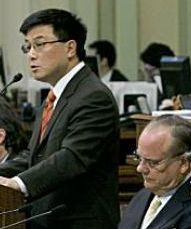Friday hearing: Will judge ‘have the [guts]’ to shut down bullet train?
![Friday hearing: Will judge ‘have the [guts]’ to shut down bullet train?](https://calwatchdog.com/wp-content/uploads/2013/11/chiang.lcokyer-890x395_c.jpg)
 On Aug. 16, Sacramento Superior Court Judge Michael Kenny handed down a landmark ruling against the $68 billion California bullet-train project. Kenny held that the state High-Speed Rail Authority’s plan to begin construction in the Central Valley in coming months broke two key taxpayer protections in Proposition 1A, the 2008 state ballot measure giving $9.95 billion in bond seed money for a statewide bullet-train system.
On Aug. 16, Sacramento Superior Court Judge Michael Kenny handed down a landmark ruling against the $68 billion California bullet-train project. Kenny held that the state High-Speed Rail Authority’s plan to begin construction in the Central Valley in coming months broke two key taxpayer protections in Proposition 1A, the 2008 state ballot measure giving $9.95 billion in bond seed money for a statewide bullet-train system.
The protections were meant to ensure the state wouldn’t spend huge sums on a train segment that wouldn’t be usable or have any utility if further segments weren’t built. One required the state to have funding firmly lined up for the 300-mile Initial Operating Segment, which the CHSRA estimates would cost $31 billion. The second required the state to have all environmental reviews completed for the Initial Operating Segment before construction began.
But Kenny’s ruling waffled on whether he had the authority to block construction. “Proposition 1A appears to entrust the question of whether to make an appropriation based on the funding plan to the Legislature’s collective judgment,” he wrote. “The terms of Proposition 1A itself give the Court no authority to interfere with that exercise of judgment.” He ordered the state to suggest “remedies” to address the deficiencies, which he will consider at a hearing this Friday in his Sacramento courtroom.
In legal briefs filed last month, Attorney General Kamala Harris’ staff responded in unexpected fashion: Instead of saying Kenny’s ruling was wrong and a misreading of Proposition 1A, the state’s lawyers argued that so long as the rail authority only used the $3.3 billion in federal funds it had been given for the project, it could proceed with work for now.
Harris’ position both elated and baffled attorneys for Kings County and two Kings County residents who are the plaintiffs in the case against the bullet train. They were elated because the state’s top lawyer accepted without challenge Kenny’s conclusion that the bullet-train project would break state law if it used state funds. But they were baffled at the AG’s opinion’s that taxpayer safeguards in Proposition 1A didn’t apply to federal funds, since they were supposed to be matched dollar for dollar by the state.
How do bullet-train advocates see path to construction?
What could be driving this legal maneuvering? How do bullet-train supporters — whose ranks at least nominally include the attorney general — see a path to construction?
Based on interviews with insiders and close observers of the bullet-train fight, the scenario builds off this assumption: “They don’t think the judge will have the [guts] to block this unilaterally,” one county supervisor from Silicon Valley told me. “He already signaled in the August decision that he didn’t want to do it … by raising the question of whether he even had the power to do it.”
 After another ambiguous court ruling, the theory holds, Controller John Chiang and Treasurer Bill Lockyer will hold their noses and go along with the sale of state bonds. Where will the $20 billion or more that the state would still need to complete the Initial Operating Segment come from, given the lack of interest from private investors who can’t legally be given subsidies or revenue guarantees? The assumption is that the federal spigot will reopen if Democrats take back the House in November 2014.
After another ambiguous court ruling, the theory holds, Controller John Chiang and Treasurer Bill Lockyer will hold their noses and go along with the sale of state bonds. Where will the $20 billion or more that the state would still need to complete the Initial Operating Segment come from, given the lack of interest from private investors who can’t legally be given subsidies or revenue guarantees? The assumption is that the federal spigot will reopen if Democrats take back the House in November 2014.
In the sequester era, the idea that there will be a surge in discretionary domestic spending anytime soon seems unlikely. The disastrous rollout of the Affordable Care Act also seems certain to be a huge damper on House Democrats’ hopes to reinstate San Francisco Rep. Nancy Pelosi as speaker.
But the initial premise of the scenario also is open to question. The judge, a 2003 appointee of Gov. Gray Davis, may not be the controversy-wary milquetoast that bullet-train admirers hope.
He has been dealing with high-speed rail litigation for years and has issued several decisions unfavorable to the state before his Aug. 16 ruling. In 2009, he agreed with Menlo Park, Atherton and environmental groups who challenged the environmental reviews used in the decision to route high-speed trains through the San Francisco Peninsula instead of East Bay. This forced the rail authority to rescind its approval of an environmental study for a major section of the bullet train’s northern route. In 2011, he rejected the rail authority’s environmental reviews for a plan to send the bullet train through Gilroy in the San Francisco Peninsula.
A ‘remedies’ hearing in which the state offers no remedies
And a rereading of Kenny’s 16-page ruling shows it to be a thorough condemnation of the rail authority’s efforts to get around Proposition 1A’s taxpayer protections. Its language also suggests that he hasn’t ruled out a range of actions because of his concerns about legislative authority. Rather than rule out injunctive relief, the ruling suggests plaintiffs will have a better chance of achieving it if they make the case on limited grounds rather than by seeking a broad ban on construction spending.
But Kenny could also strike a decisive blow against the bullet train without ordering a moratorium on construction until funding had been firmly identified and environmental reviews completed for the first 300 miles of the project. In his “remedies” ruling, he could again conclude that the final authority on spending decisions rested with the Legislature — then warn bluntly of the impropriety of issuing state bond funds for a project that violates plainly written state laws.
There’s also the chance that the state’s decision to respond to his request for remedies by not offering any might incense him into more decisive action. Kenny’s Aug. 16 ruling treated it as a given that the state would take his concerns seriously. The attorney general didn’t. Instead, Kamala Harris gave the rail authority a fig leaf and a questionable temporary reprieve.
Will Kenny’s judicial temperament prompt him to overlook this diss? We shall see.
Related Articles
Weeds could whack your house and job
Failure to keep up your property in California could damage your credit rating, prohibit you from buying or selling property,
Gov Hails One Vehicle Code
Anthony Pignataro: Traffic speeders have no fear — Governor Arnold Schwarzenegger has signed SB 949 into law. This bill, authored
CA vs. FL dogfight over stealth plane subsidies
Like a professional sports team in search of a new taxpayer-funded arena, two defense contractors are playing California and Florida lawmakers




